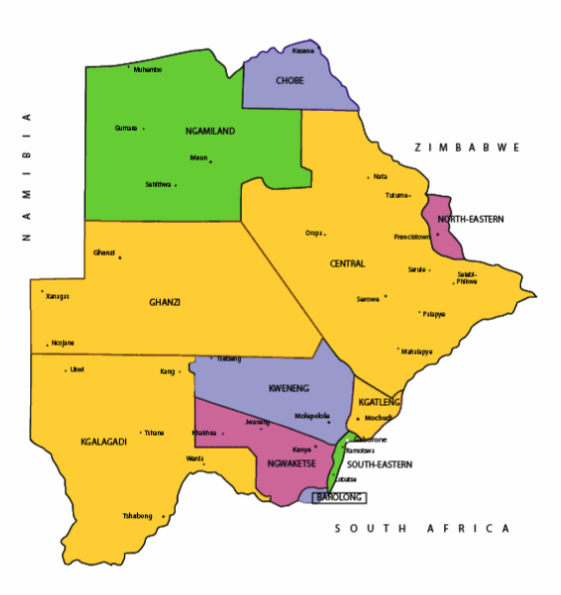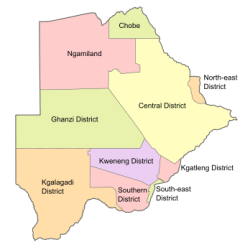Places and their polling stations in Moshupa-Manyana, Botswana
428 Moshupa North
2009 Bakgatla Primary School
2010 Moshupa Sub-Land Board
2011 Moshupa SSS
2012 Diratsame JSS
429 Moshupa East
2013 Moshupa Community Hall
2014 Phuting Kgotla
2015 Tent At Goo-Kodisa
2016 Kgabosetso Primary School
2017 Bakoko Primary School
2018 Moshupa Main Kgotla
2019 Modimele Kgotla
2020 Gatsalatladi Tent
430 Manyana-Mogonye
2021 Boswelakgosi JSS
2022 Manyana Kgotla
2023 Manyana Primary School
2024 Mogonye Primary School
2025 Bikwe Kgotla (Tent)
431 Moshupa South
2026 Polokwe Primary School
2027 Matlhakola Mobile Clinic
2028 Pywetle Mobile Stop
2029 Baitirile JSS
2030 Moshupa Brigade
2031 Kgabophuti Primary School
2032 Kebonyekgotla Primary School
432 Moshupa West
2033 Mosielele Primary School
2034 Mmanaana JSS
2035 Department of Water Affairs Office
2036 Ywca Day Care Centre
2037 African Methodist Episcopal Church of Southern Africa
433 Lotlhakane West
2038 Tshwaane Primary School
2039 Ranoi Primary School
2040 Lotlhakane Kgotla
2041 Tlanege Mobile Health Stop
2042 Marutlwe Kgotla (Tent)
2043 Makapane Mobile Health Stop
2044 Makapane (Tent)
2045 Maselwana (Tent)
434 Ralekgetho
2046 Ralekgetho Primary School
2047 Molomoojang Mobile Stop
2048 Sehibidung VDC House
2049 Dibate Borehole (Tent)
435 Pitseng
2050 Pitseng Kgotla
2051 Pitseng Primary School
2052 Kubukwane Mobile Health Stop
2053 Machana Mobile Health Stop
2054 Naledi Mobile Health Stop
Reference: iec.gov.bw/index.php/electoral-districts/polling-stations.html
Botswana
Botswana is a country in Africa. It is topographically flat, with approximately 70 percent of its territory being the Kalahari Desert.
It is bordered by South Africa to the south and southeast, Namibia to the west and north, and Zimbabwe to the northeast.
Capital: Gaborone
Currency: Botswanan Pula
Official language: English
Population: 2.588 million (2021) World Bank
Dialing code: +267
Gross Domestic Product: 17.61 billion USD (2021) World Bank
Botswana’s ten districts are:
- Southern District
- South-East District
- Kweneng District
- Kgatleng District
- Central District
- North-East District
- Ngamiland District
- Kgalagadi District
- Chobe District
- Ghanzi District
Botswana’s councils created from urban or town councils are: Gaborone City, Francistown, Lobatse Town, Selebi-Phikwe Town, Jwaneng Town, Orapa Town and Sowa Township.






The name Botswana refers to ‘Land of the Tswana’. The landlocked, Southern Africa country is officially known as the Republic of Botswana.














Botswana is connected to Zambia through the Kazungula Bridge making it the world’s shortest border between two countries.
A country of slightly over 2 million people (2021), Botswana is one of the most sparsely populated countries in the world. It is essentially the nation state of the Tswana ethnic group, who make up 79% of the population.

About 11.6 per cent of the population lives in the capital and largest city, Gaborone.
Formerly one of the world’s poorest countries—with a GDP per capita of about US$70 per year in the late 1960s—it has since transformed itself into an upper-middle-income country, with one of the world’s fastest-growing economies.


The Tswana ethnic group were descended mainly from Bantu-speaking tribes who migrated southward of Africa to modern Botswana, living in tribal enclaves as farmers and herders.




In 1885, the British colonised the area and declared a protectorate under the name of Bechuanaland.
As colonisation stopped, Bechuanaland became an independent republic under its current name on 30 September 1966.


Since then, it has been a representative republic, with a consistent record of uninterrupted democratic elections and the lowest perceived corruption ranking in Africa since at least 1998.

The economy is dominated by mining and tourism. Botswana has a GDP (purchasing power parity) per capita of about $18,113 as of 2021, one of the highest in subsaharan Africa.


Botswana is the world’s biggest diamond producing country.
Its relatively high gross national income per capita gives the country a high standard of living and the third-highest Human Development Index of continental Sub-Saharan Africa (after Gabon and South Africa).
The country has been adversely affected by the HIV/AIDS epidemic. In 2002, Botswana began offering anti-retroviral drugs (ARVs) to help combat the epidemic.
Botswana is a member of the Southern African Customs Union, the Southern African Development Community, the Commonwealth of Nations, and the United Nations.

